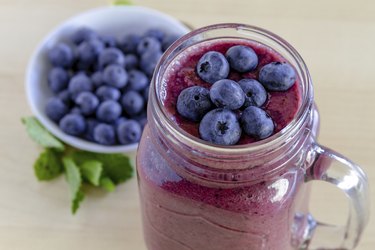
The U.S. Department of Agriculture's MyPlate guide to healthy eating recommends you include a serving of fruit at each meal. Smoothies can be an easy and tasty way for you to meet your mealtime fruit needs. It can also be healthy if you include the right ingredients. A healthy blueberry smoothie includes 1/2 cup of fresh or frozen blueberries, 1/2 cup of low-fat vanilla yogurt, 1/2 cup of 1 percent fat milk and ice. This smoothie is low in calories, high in calcium and a good source of antioxidants.
Low in Calories
Video of the Day
As long as you use low-fat dairy products and the fruit as its own natural sweetener, a blueberry smoothie makes a low-calorie treat. The healthy blueberry smoothie recipe contains 114 calories. If you follow a 2,000-calorie diet, the smoothie meets less than 10 percent of your daily calorie needs, plus provides you with a healthy serving of fruit and milk.
Video of the Day
High in Calcium
Using milk and yogurt in the blueberry smoothie makes it a good source of calcium, with 207 milligrams. Adequate intakes of calcium are needed to help keep your bones healthy and strong. Most women do not get enough calcium in their diets, according to the Office of Dietary Supplements, increasing their risk of developing osteoporosis. Adults need 1,000 to 1,200 milligrams of calcium a day. One blueberry smoothie meets about 20 percent of your daily needs.
Rich in Antioxidants
Drinking a healthy blueberry smoothie may protect you against chronic diseases. Blueberries are rich in antioxidants. Antioxidants are substances in food that protect your cells against free radical damage. Free radicals are molecules produced from the breakdown of food and from contact with environmental toxins such as tobacco smoke. These molecules damage cells, increasing your risk of heart disease and cancer. The protective antioxidants in the smoothie include selenium, vitamin C, beta carotene, lutein and a small amount of vitamin E.
Good Source of Potassium
The blueberry smoothie is also a good source of potassium. Potassium is a mineral your body needs to help maintain fluid balance and normal muscle and nerve function. Including potassium-rich foods in your diet may also help lower blood pressure by decreasing the effects of sodium. The American Heart Association recommends 4,700 milligrams of potassium a day. A high-potassium diet is not for everyone. If you have a history of kidney disease or high blood levels of potassium, you should talk to your doctor before increasing your potassium intake.
- American Dietetic Association: Treat Yourself to a Healthy Smoothie
- Public Health - Seatle & King County: Frozen Blueberry Smoothie
- U.S. Highbush Blueberry Council: Blueberry Nutrition
- USDA's MyPlate: ChooseMyPlate.gov
- Recipe Nutrition: Blueberry Smoothie
- Office of Dietary Supplements: Calcium
- MedlinePlus: Antioxidants
- American Heart Association: Potassium and High Blood Pressure